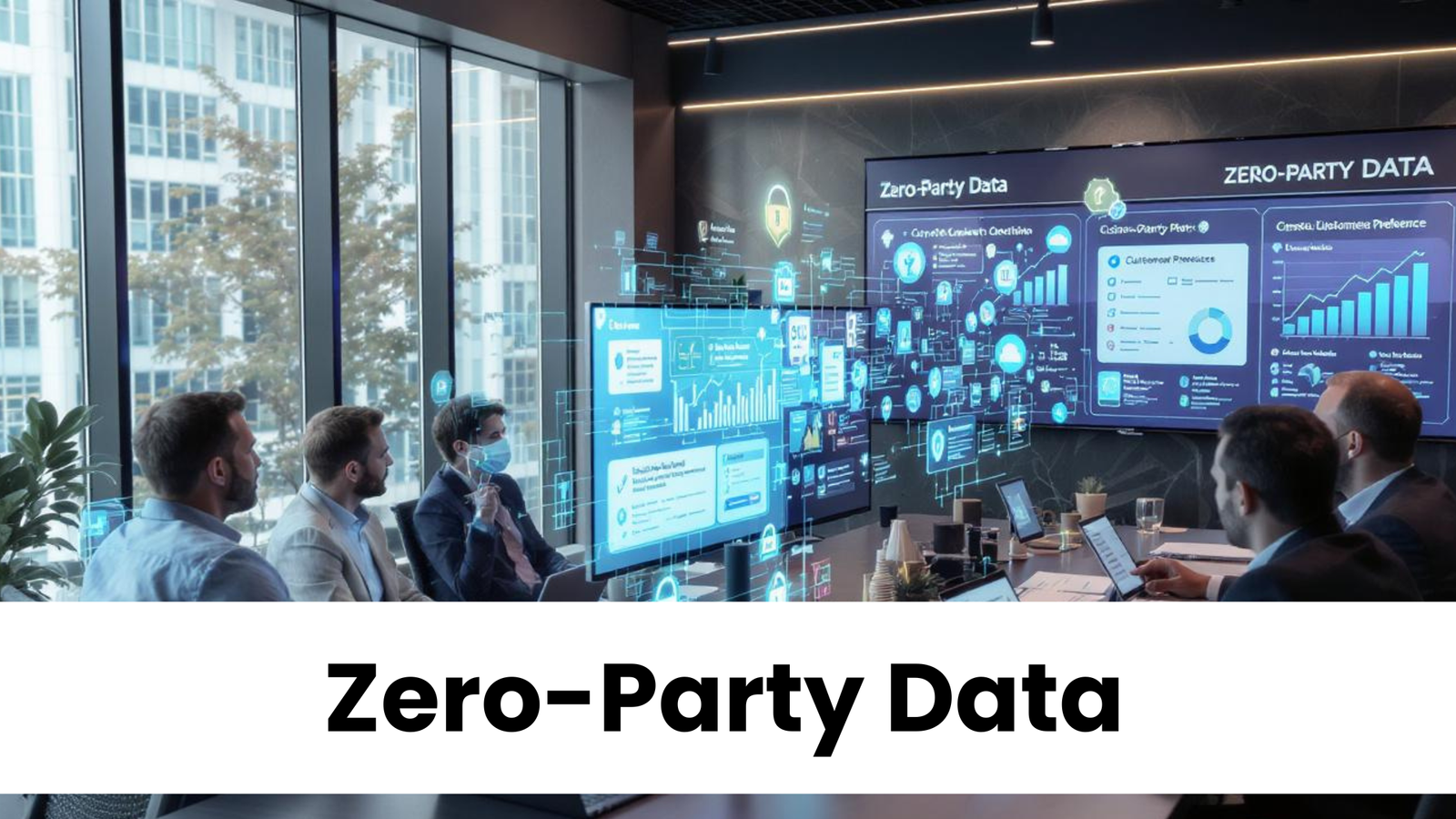In the modern B2B marketing landscape, transparency and trust are no longer optional—they are the core pillars that determine brand success. As data privacy laws evolve and customer awareness grows, businesses are shifting toward more ethical data practices. This is where Zero-Party Data becomes a game changer. Unlike traditional data collection methods, Zero-Party Data is information that customers willingly share with brands, creating a foundation for transparency, personalization, and compliance that aligns perfectly with the ethical demands of today’s digital ecosystem.

Understanding Zero-Party Data in B2B Marketing
Zero-Party Data refers to the data that prospects and customers intentionally provide, such as their preferences, needs, and communication choices. Unlike first-party or third-party data, which rely on observation or collection from external platforms, Zero-Party Data is completely voluntary. In B2B marketing, this approach ensures that every piece of data comes with consent, paving the way for authentic engagement rather than invasive targeting.
Acceligize, a leading global B2B demand generation company, emphasizes how Zero-Party Data empowers brands to build meaningful relationships based on mutual respect and trust. When customers know that their data is used ethically and transparently, their willingness to interact and engage with brands multiplies.
The Shift from Data Exploitation to Data Empowerment
For decades, marketers depended heavily on cookies, trackers, and behavioral analytics to understand customer intent. While these methods provided valuable insights, they also raised serious ethical and privacy concerns. The introduction of GDPR, CCPA, and other data protection regulations forced companies to rethink their data collection strategies.
Zero-Party Data marks a cultural and operational shift. It moves the power from marketers to customers—giving them control over how their information is shared and used. In the B2B world, where relationships are long-term and decision-making involves multiple stakeholders, such empowerment leads to higher trust, improved communication, and better alignment between business objectives and client needs.
How Zero-Party Data Enhances B2B Marketing Ethics
- Consent-Driven Data Collection
Every piece of Zero-Party Data is provided by the customer with explicit consent. This ethical approach eliminates gray areas in data usage and ensures compliance with all global data protection regulations. - Transparency and Accountability
B2B organizations that use Zero-Party Data can clearly communicate how data will be utilized, promoting transparency at every interaction. This builds a sense of accountability and helps brands stand apart in industries where data misuse has eroded trust. - Ethical Personalization
Traditional personalization methods often rely on predictive models or tracking user behavior secretly. In contrast, Zero-Party Data allows marketers to personalize messages based on information customers willingly share—ensuring the personalization feels respectful, not invasive. - Elimination of Data Guesswork
With Zero-Party Data, B2B marketers no longer need to infer customer intent. They can directly access accurate, preference-based insights that help tailor solutions, campaigns, and communication strategies effectively.
The Role of Acceligize in Promoting Ethical Data Practices
Acceligize has been a pioneer in redefining B2B marketing with data-driven ethics. By integrating Zero-Party Data into their lead generation, nurturing, and content syndication solutions, they help brands strengthen compliance while achieving deeper engagement. Their global network allows businesses to reach relevant decision-makers through consent-based marketing—ensuring every connection starts with trust.
Acceligize’s approach demonstrates how B2B organizations can align marketing goals with ethical standards. Their emphasis on consent, data transparency, and client trust creates a benchmark for the industry, helping marketers future-proof their strategies in an age of privacy-first marketing.
Building Ethical Customer Relationships
At its heart, Zero-Party Data enables companies to move from transactional relationships to value-driven partnerships. When B2B buyers share information voluntarily, they expect brands to respect that data and use it to provide genuine value. This expectation becomes the cornerstone of ethical marketing.
Marketers who harness Zero-Party Data can design hyper-personalized experiences without crossing privacy boundaries. This includes delivering relevant content, aligning communication frequency with buyer preferences, and offering solutions tailored to specific business pain points. Over time, this consistent respect for data fosters loyalty and strengthens brand credibility.
The Compliance Advantage
Compliance is not just a legal checkbox; it is an ethical responsibility. In the wake of global data privacy regulations, B2B marketers must ensure that their campaigns meet stringent standards of consent and data governance. Zero-Party Data simplifies this challenge by ensuring that all information originates from voluntary customer input.
By implementing structured consent forms, preference centers, and transparent data policies, businesses can maintain compliance effortlessly. More importantly, they build trust-based ecosystems where customers feel confident sharing information because they understand how it will be used.
Ethical Data Strategies for Modern B2B Marketers
To adopt Zero-Party Data effectively, B2B marketers must embrace a mindset of transparency and value exchange. Here are a few key strategies:
- Create Interactive Data Collection Channels
Use surveys, webinars, gated content, and preference forms to collect data directly from prospects. Offer meaningful incentives like personalized reports or insights in return. - Leverage Consent Management Platforms
Implement systems that allow users to update their data sharing preferences anytime. This flexibility ensures compliance and demonstrates respect for user autonomy. - Prioritize Education and Awareness
Communicate openly about how data is collected, stored, and applied. Educated clients are more likely to engage and share information willingly. - Integrate Ethical Data Use in Marketing Culture
Train teams to understand the importance of Zero-Party Data and ensure it becomes part of your organization’s culture—not just a compliance task.
Future of Ethical B2B Marketing with Zero-Party Data
As third-party cookies continue to phase out, Zero-Party Data will emerge as the most reliable and compliant way for marketers to understand and engage their audiences. Ethical marketing will no longer be a differentiator but a necessity. Companies that adapt early will not only comply with regulations but also establish themselves as trusted partners in their industries.
Acceligize’s focus on privacy-first marketing positions them at the forefront of this transformation. Their strategies ensure that clients can reach the right audience ethically while nurturing relationships built on transparency and respect.
Why Ethics Will Define B2B Success in 2025 and Beyond
The future of B2B marketing belongs to brands that treat data as a privilege, not an entitlement. In an era where business buyers expect accountability, authenticity, and data integrity, Zero-Party Data is the ultimate solution. It not only ensures compliance but transforms how businesses interact, communicate, and grow together in a privacy-first world.
Through responsible data practices and transparent engagement, companies can turn ethical marketing into a powerful driver of trust and long-term success.
Read Full Article : https://acceligize.com/featured-blogs/zero-party-data-in-b2b-marketing-building-trust-compliance/
About Us : Acceligize is a global B2B demand generation and technology marketing company helping brands connect with qualified audiences through data-driven strategies. Founded in 2016, it delivers end-to-end lead generation, content syndication, and account-based marketing solutions powered by technology, creativity, and compliance.

